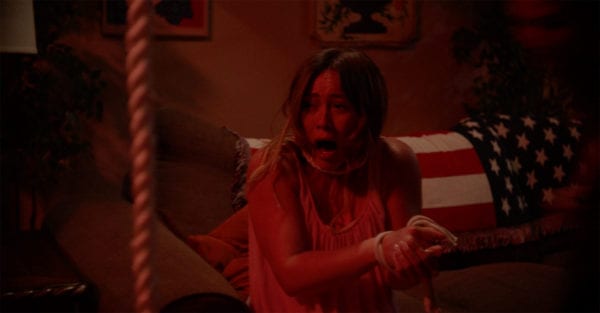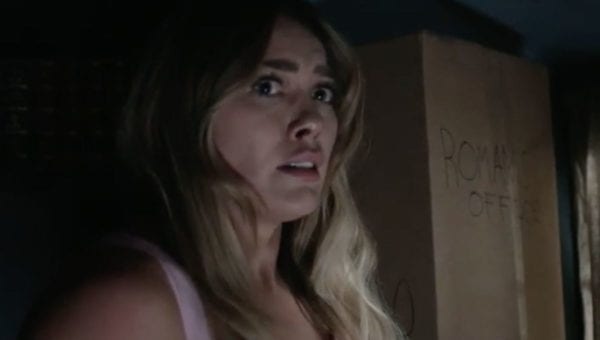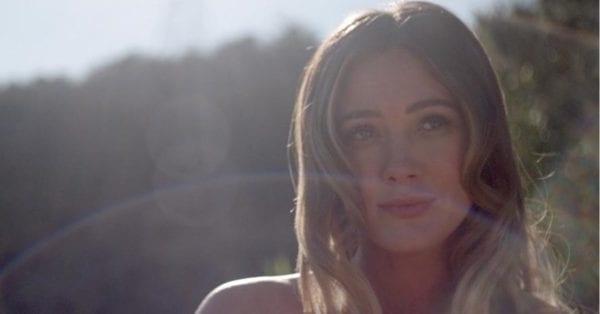The Haunting of Sharon Tate, 2019.
Directed by Daniel Farrands.
Starring Hilary Duff, Jonathan Bennett, Lydia Hearst, Pawel Szajda, Ryan Cargill, Bella Popa, Fivel Stewart, Tyler Johnson, and Ben Mellish.

SYNOPSIS:
Pregnant with director Roman Polanski’s child and awaiting his return from Europe, 26-year-old Hollywood actress Sharon Tate becomes plagued by visions of her imminent death.

1969’s Benedict Canyon slaughter of pregnant actress Sharon Tate and three houseguests by Charles Manson’s devout congregation is forever etched into Hollywood’s bedrock. Roman Polanski’s wife, a days-away mother to be, met an undeserved “fate” on what should have been a peaceful California night. Unimaginable tragedy rocked a nation, crippled those affected, and provoked controversy from the Tate family’s successful lobbying for victim’s rights to theories of the tongue or printed variety that only furthered heartache. Better left buried: a painful memory of Manson’s cult legacy.
Unless you’re Daniel Farrands and Saban Films – the collaborators responsible for 2019’s midnighter cash-in “reimagining” titled The Haunting Of Sharon Tate.
Hilary Duff plays a caricature of Sharon Tate who’s overtaken by dreamlike visions of her impending August murder. Jay Sebring (Jonathan Bennett), Abigail Folger (Lydia Hearst), and Wojciech Frykowski (Pawel Szajda) attempt to calm the increasingly paranoid Tate, but dropped-off envelopes from an unknown “Charlie” keep housebound occupants on edge. Tate routinely wakes in the middle of the night, screaming, as she rants about satanic invaders who intend to murder Tate’s entire clan. No one believes, as the eight-months-in awaiting mother keeps waxing on about “destiny” and “fate,” until a late-night visit from four strangers evokes the bloodshed forewarned.

Yes. Farrands has shamelessly reimagined the infamous starlet homicide as a paranoid bumps-at-night spooker worth no catharsis, reverence, or necessity. Farrands failed at the same task earlier this year with his Long Island origin story, The Amityville Murders. Sharon Tate’s name has been tied to exploitation, debate, and emotional scars ever since her death. You’d better have a damn fine reason to repurpose her murder as true crime poignancy or offer a creative perspective worthy of such a cause. The Haunting Of Sharon Tate does neither, threading paint-by-numbers horror beats into a portrayal of Tate herself much akin to “The Actress Who Cried Cult Massacre.”
Writing Tate as this hallucinating, babbling “loon” type out of perceived cleverness backtracks on her position as a victim. Roughly 90% of Duff’s dialogue runs on and on about how we’re all careening down these pre-determined roads towards finality as designed by higher powers. Over, and over, “Do you think we can alter your lives? Are the choices we make conscious choices? Can we alter our futures?” You know, because – wink wink, nudge nudge – Tate’s brutal death awaits in coming scenes? Everyone smiles, strokes her hair, and reassures her towards death. Nothing gained from premonitions of brutality, glimpses of Manson standing in her house, or hearing “Helter Skelter” chant behind recorded music when played backward.
The Haunting Of Sharon Tate doesn’t prove itself nearly a sharp enough horror narrative to answer the question of, simply put, “why.” An early animal death with maggots and buzzing flies adds zero heft to plotting because, honestly, do you *need* a senseless canine corpse to prove HOW EVIL CHARLES MANSON’S FAMILY MAY INDEED BE? “Scares” are nothing more than faces or hands flashing into window frames just before they’re shut. Don’t get me wrong, Farrands gets gruesome when that guillotine blade finally falls – but much like The Amityville Murders, CGI weakens a rather vicious spectacle. Nooses hung, knives brandished, guts sliced. Farrands’ issue is not visual representation – cinematography captures 60s LA overhead via sprawling helicopter shots – but in traumatic profiteering.
The odd part is performances aren’t offputting – it’s character construction and development. Duff’s increasing unrest – during pregnancy no less – toes a curiously close line to Marilyn Monroe impersonation, but conveys fear, neglect (Polanski’s absence), and distrust of those using her platform for personal gain. Jonathan Bennett does his best as Tate’s confidant and closest ally, rockin’ that 60s speedo bottom for his character’s lasting image. Lydia Hearst and Pawel Szajda? The former a planted herring who rushes to Tate’s side as den mother despite aiding her partner’s schemes, the latter a big-mouth-flappin’ Polanski crony who cockily endangers the party through shouted aggression. All dressed in period-snazzy era costumes which accent production design with splendid cloths.

For Daniel Farrands, The Haunting of Sharon Tate lacks developmental basics that might’ve emboldened his thematic choice of resurrecting Sharon Tate only to be murdered once more. Under such scrutiny, composition had to be air-tight. As is, Farrands repurposes legend as a generic satanic panic slice of home invasion savagery that plays out like a billion similar titles before (e.g.: mirror scare). Hell, it’s not even that “haunted” getting down to nitty-gritty? Respect, honor, and reason come in a disappointing last place on this horror rehash’s list of accomplishments once the ending credits roll (after a flipped narrative ending attempts some philosophical epiphany finale that face-plants, no less).
Flickering Myth Rating – Film: ★ ★ / Movie: ★
Matt spends his after-work hours posting nonsense on the internet instead of sleeping like a normal human. He seems like a pretty cool guy, but don’t feed him after midnight just to be safe (beers are allowed/encouraged). Follow him on Twitter/Instagram/Letterboxd (@DoNatoBomb).












